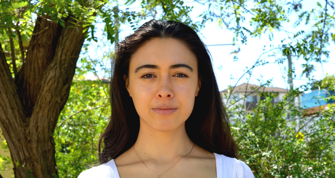Explore upcoming events

As May rapidly approaches, we are so excited to welcome you to the Festival and to introduce you to the writers who make it all worthwhile. To awaken your Festival spirit, we're got a series of Q&As to introduce some of the 2024 participants. Get to know them as we discuss their reading, their writing practice and the Festival theme, Take Me Away.
General Manager of Sweatshop Literacy Movement, Winnie Dunn is a Tongan-Australian writer from Mount Druitt. Her debut novel, Dirt Poor Islanders, follows Meadow Reed as she navigates identity and community within Western Sydney.
Is there a book you wish you could read for the first time again?
The Whale Rider by Witi Ihimaera. It taught me that a young ‘fob’ girl could actually be at the centre of a novel.
What books or writers inspire you?
So many wonderful writers have supported my journey to become an author and I strongly recommend their work: Funny Ethnics by Vietnamese-Australian writer Shirley Le. Songs for the Dead and the Living by Palestinian-Australian writer Sara M Saleh. Safe Haven by Sri Lankan-Australian writer Shankari Chandran. The Mother Wound by Lebanese-Australian writer Amani Haydar. Can’t forget the first Tongan-Australian children’s book, I Am Lupe, written by Sela Ahosivi-Atiola. And my personal favourite, The Tribe by Lebanese-Australian writer Michael Mohammed Ahmad.
What made you want to write Dirt Poor Islanders?
I based Dirt Poor Islanders on my personal and lived experiences as a Tongan-Australian growing up in Mount Druitt. To date, the only representations of Pasifikas have been in the realm of rugby league, true crime reportage and, most infamously, Chris Lilley’s minstrel brownface mockumentaries, Summer Heights High and Jonah from Tonga. Through my debut novel, I desired to change these stereotypes and reveal the true beauty and complexity of my community.
What’s something that surprised you about writing your debut novel, Dirt Poor Islanders?
Like Dirt Poor Islanders’ narrator, Meadow Reed, my own biological mother passed away from cancer when I was four. Fifteen years later, I discovered my birth-mother’s diary in a box of her old things. It was written in 1995, the year I was born. With wide and curly handwriting my mother spoke to me from beyond the grave. ‘Little Bib’ she called me; Western Sydney slang for ‘Little Habib’. It was then I realised that my birth-mother, Mafile’o Theresa Helen Dunn, was a writer from the hood who never got to share her story. While completing Dirt Poor Islanders, I spent a lot of time at my mum’s grave in Rookwood Cemetery. And, every now and again, a slight breeze sounded like pen on paper.
What do you hope readers take away from your work?
I hope the Pasifika community will see themselves represented in the following ways: crowded Taragos, loud laughs around makeshift dinner tables, tears shed in dark places, sweaty hugs, woven flowers, ngatu patterns and the small voice which reminds us that even the most gorgeous bougainvillea can grow from a fizzy can in the gutter.
And I hope our broader Australian society will see a real side of the Pasifika community: big, beautiful, flawed, intelligent and rich in stories to tell.
What events are looking forward to attending at the Festival?
The event I’m most excited for is The Secret Life of Women featuring Sara M Saleh, Balli Kaur Jaswal and Elizabeth Acevedo. We need to hear the voices of Palestinian, Singaporean and Latinx women now more than ever!
I’m also enthusiastic for the intergenerational, intercultural and interpersonal exchange between Benjamin Law and Viet Thanh Nguyen, A Man of Two Faces.
